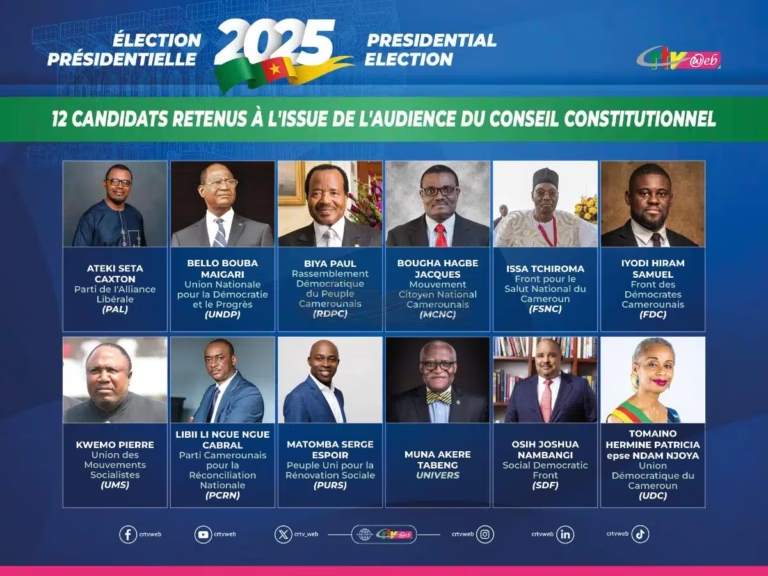With less than two months to go until the presidential election on October 12, 2025, Cameroon is about to relive a familiar, almost ritualistic scenario. Paul Biya, 93 years old and in power since 1982, is running for an eighth term, against an opposition that, once again, seems to be engaged in a suicidal race. Eleven opposition candidates against a single incumbent: in a single-round election, it’s not a battle, it’s a stampede. In this week’s edition of Jeune Afrique, the question is put bluntly: is Cameroon’s opposition the dumbest in Africa? It’s a bitter observation, but one that’s borne out by the chronic inability of the opposition to unite, when unity would be strength – or at least offer a real chance of overturning the established order.
A division that goes back to the roots Nothing new in the Cameroonian tropics.
As early as the 1990s, after the introduction of multiparty politics, the opposition was characterized by internal squabbles rather than a coherent strategy. As long ago as 2004, an article in Jeune Afrique entitled “Comment l’opposition s’est suicidée” (“How the opposition committed suicide”) highlighted the egocentricity of its leaders, who preferred to shine alone rather than combine forces. Twenty years on, the refrain is the same. Despite repeated calls for a single candidacy, egos and ethnic – or simply personal – rivalries have got the better of good intentions. A dozen parties have attempted to designate a “consensus candidate” at meetings in Foumban and Yaoundé, but to no avail. Opposition heavyweight Maurice Kamto was rejected by the Constitutional Council on a technicality relating to his new party, Manidem. As a result, the others, such as Issa Tchiroma Bakary, Bello Bouba Maïgari, Cabral Libii and Joshua Osih, are fighting for the crumbs of a scattered vote.
François Soudan, editor-in-chief of Jeune Afrique, doesn’t mince his words in his editorial: “This dispersion is tantamount to collective political suicide. Each divided vote mechanically strengthens the incumbent candidate.” As for Biya, he doesn’t even need to multiply his rallies. His party, the Rassemblement démocratique du peuple camerounais (RDPC), is banking on national lethargy and his opponent’s divisions. In the Septentrion, a historic bastion of power, former allies such as Maïgari and Tchiroma have withdrawn, but without any real impact. The opposition, for its part, is playing for keeps: the battle is no longer to win, but to be the best loser in order to negotiate positions or post-electoral favors.
Kamto, the heavyweight absentee
The exclusion of Maurice Kamto, former Minister of Justice who switched to the opposition in 2018, is the coup de grâce. Leader of the Movement for the Rebirth of Cameroon (MRC), he had mobilized impressive crowds during the last presidential election, vigorously contesting the results. This time, his appeal rejected by the Constitutional Council – a decision described by his lawyers as “more political than legal” – has accelerated the explosion of the anti-Biya camp. His supporters denounced an “electoral hold-up”, with demonstrations dispersed with tear gas in front of the institution. Without Kamto, who could claim an honorable score (around 20% in 2018), the other candidates are struggling to unite. Akere Muna, a respected lawyer and civil society figure, pleads for union, but his appeals fall on deaf ears. Hermine Patricia Tomina Ndam Njoya, the only woman in the running, brings a touch of diversity, but her influence remains limited.
The context doesn’t help: the Anglophone crisis in the North-West and South-West regions has been ongoing since 2016, with over 160,000 internally displaced people and accusations of human rights violations on both sides. Add to this the threat of Boko Haram in the Far North, galloping youth unemployment (over 60% of the population is under 35) and an economy at half-mast. The opposition could capitalize on these frustrations, but prefers to tear each other apart. Speaking to RFI, Soudan analyzes: “It’s an election date that’s almost a foregone conclusion.” International observers, such as the European Union and the United States, are already criticizing potential irregularities, but without unity, their reports will change nothing.
Dark prospects, but hope among the young?
Despite everything, cracks are appearing in the Biyass monolith. Young people, impatient for change, are mobilizing via social networks. Figures like Hiram Iyodi, 37, an engineer and candidate for the Front des Démocrates Camerounais, are surfing TikTok and X to rally voters. “Stop treating us like electoral pawns,” says Nchang Cho Clinton, a civil society activist. Some young people have even raised 40 million CFA francs for Biya’s campaign – a controversial gesture that raises doubts about its sincerity, given endemic unemployment. But overall, the opposition is missing the point: instead of channelling this energy, it is letting it evaporate in phantom alliances. In conclusion, describing Cameroon’s opposition as “the dumbest in Africa” is provocative, but justified by decades of failure. Faced with an authoritarian regime that controls the media, the judiciary and the forces of law and order, only a solid coalition could force an alternation. For the time being, October 12 looks set to be a formality for Biya, extending a reign that borders on world records. Cameroon deserves better than this recurring comedy. Will the opposition ever learn from its mistakes? History, tragic as ever, awaits the answer.
In the meantime, it has to be said that Cameroon’s opposition is certainly the dumbest in Africa.



